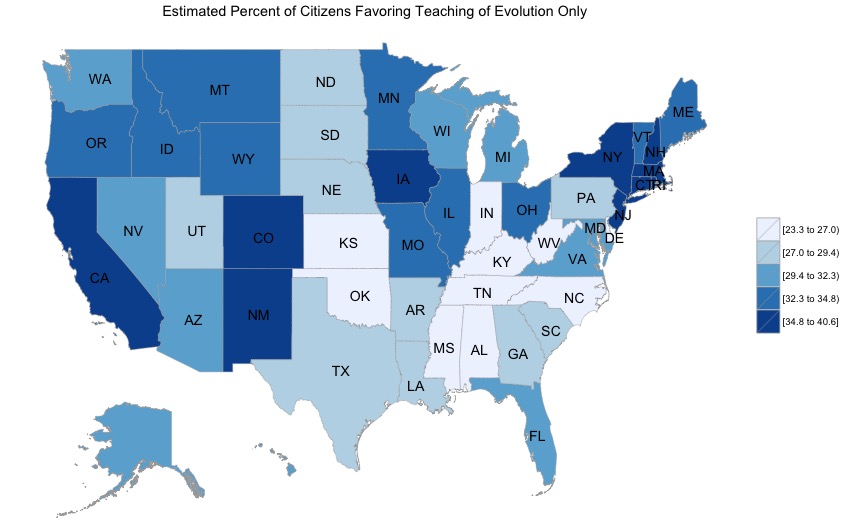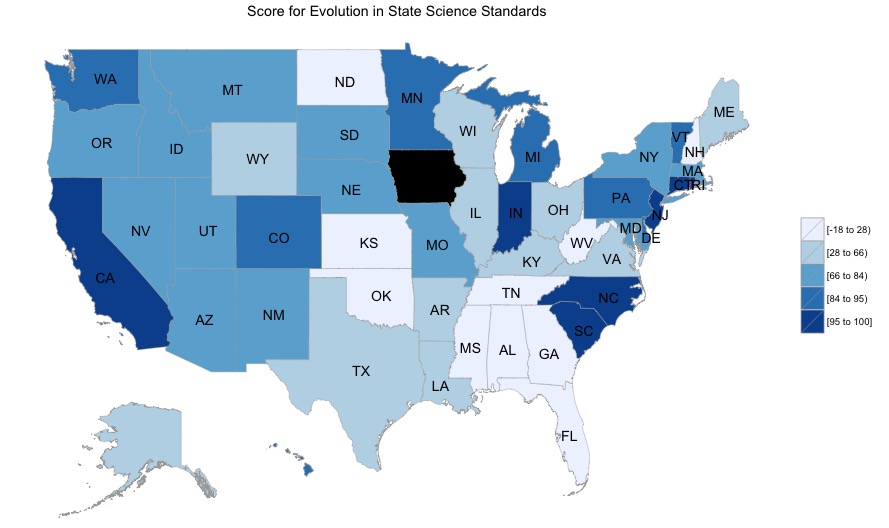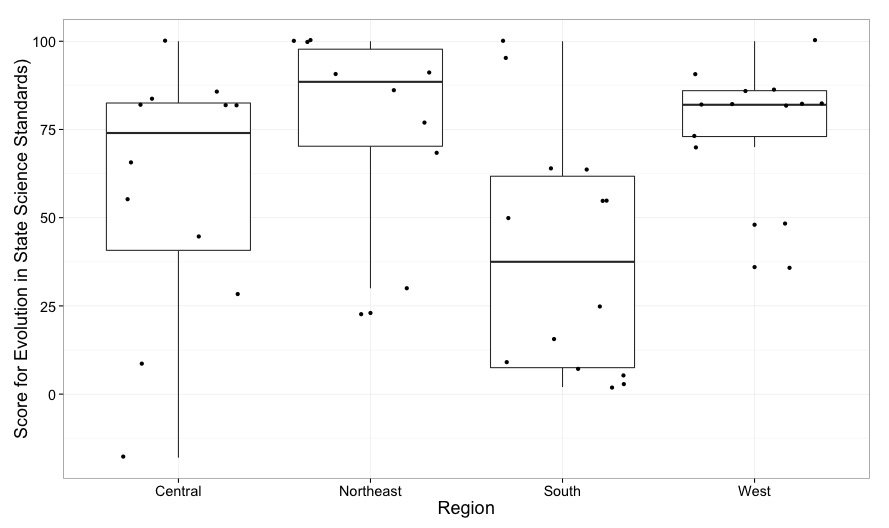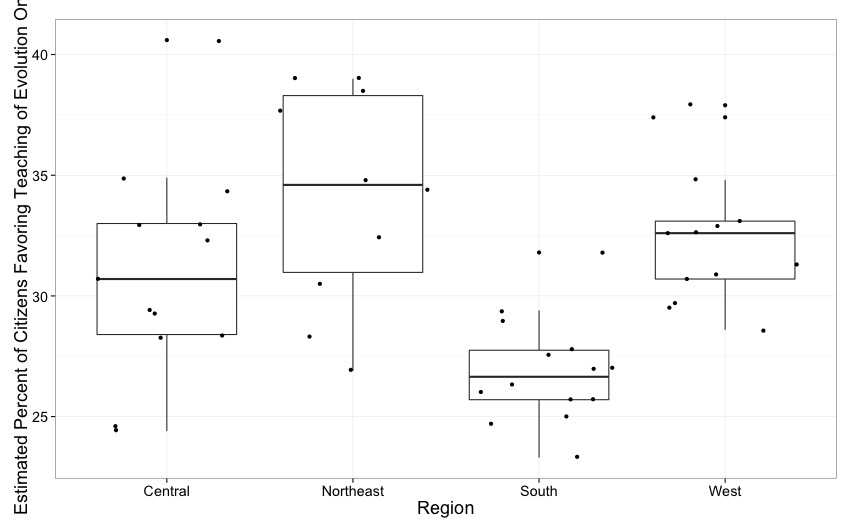My journey for understanding the frequently tense relationship between the South and science has led me to an unlikely place—Oakland, California. In what appears to be a former auto body shop, complete with large garage doors, resides the National Center for Science Education (NCSE), an organization striving to keep evolution and climate change science in public school curricula. NCSE serves as a clearinghouse of information, resources, and literature including everything from creationist pamphlets, news articles, evolution textbooks, and policy documents to email exchanges and hate mail. I am currently pouring over boxes of vitriol in paper form. “You are the enemy.” “You commie bastards. Leave other people’s children alone.” And my personal favorite, “I think you should be locked up with your monkey ancestors.” (Never mind that spending a day hanging around with monkeys actually seems fantastic.) You likely have an image in your head of the kind of person that writes these words—Southern, poorly educated fundamentalists. You may be surprised that these words originated from residents of Minnesota, Arizona, and New Hampshire.
In part this assumption stems from the fact that some of the most famous legal cases about teaching in evolution in classroom have occurred in the South. In 1925, in The State of Tennessee v. John Thomas Scopes, commonly referred to as the Scopes Monkey Trial, substitute high school teacher, John Scopes, was accused of violating Tennessee’s Butler Act which made it unlawful to teach human evolution in any state-funded school. In the 1968 case Epperson v. Arkansas, 10th grade teacher Susan Epperson filed a suit to test the constitutionality of Arkansas state law prohibiting the teaching of human evolution in public schools. Both courts ruled in favor of teaching of evolution in the public classroom. In the latter, the U.S. Supreme Court stated the First Amendment prohibits a state from requiring, in the words of the majority opinion, “that teaching and learning must be tailored to the principles or prohibitions of any religious sect or dogma.”
The geographic locality of these landmark cases, along with the often-unfavorable press coverage of stereotyped Southerners, has bolstered the view of an anti-science South. The famous journalist H.L. Mencken who covered the Scopes trial characterized the local population of Tennesseans as “morons”, “hillbillies”, and “peasants” with “degraded nonsense which country preachers are ramming and hammering into yokel skulls.”
Down the street from NCSE, I am grabbing a hamburger at an oddly Southern inspired restaurant with my long time friend and colleague Josh Rosenau. Josh is NCSE’s Program and Policy Director, a rather succinct title, given his actual daily responsibilities of working with grassroots groups across the U.S., testifying before school boards, organizing scientists and concerned citizens, meeting with legislators, speaking with journalists across the country, and contributing writings to dozens of popular media venues. His characteristic bow tie and gentile nature often seem better suited for a Savannah gentleman of leisure than a Jersey raised superhero charged with defending science education. “The South doesn’t have a monopoly on being antiscience. I’ve worked with groups across the U.S. Nearly every state has tried to pass anti-evolution legislation.” Indeed, that morning Josh pointed me to a series of file cabinets designated to “flair ups” files. The folders are named for places where an incident as occurred ranging all the way from Templeton, California to Dahlonega, Georgia and everyplace in between. I see just as many folders in these cabinets from outside the South as I do from within.
 In one of the most thorough books every written on the subject, Evolution, Creationism, and the Battle to Control America’s Classrooms, Pennsylvania State University political scientists Michael Berkman and Eric Plutzer state, “there is overwhelming evidence…No matter how the questions are asked, no matter the theme of the survey, no matter the sponsor of the survey, we see again and again evidence that large majorities of Americans want to see creationism taught in the public schools.” In general between 33-44% of those polled, depending on the poll, favor teaching creationism instead of evolution in public schools. The percentages are even higher, 59.5-68.1%, for teaching creationism along side evolution.
In one of the most thorough books every written on the subject, Evolution, Creationism, and the Battle to Control America’s Classrooms, Pennsylvania State University political scientists Michael Berkman and Eric Plutzer state, “there is overwhelming evidence…No matter how the questions are asked, no matter the theme of the survey, no matter the sponsor of the survey, we see again and again evidence that large majorities of Americans want to see creationism taught in the public schools.” In general between 33-44% of those polled, depending on the poll, favor teaching creationism instead of evolution in public schools. The percentages are even higher, 59.5-68.1%, for teaching creationism along side evolution.

 Geographic variation does exist in these relationships and it would be disingenuous to not recognize that anti-teaching evolution sentiment is not greatest in the South. However, it is equally disingenuous to think it only exists in the South. In New England, 20% of those polled believed the statement “Human beings developed from earlier species of animals” is false. In the Pacific states, this rises to 29%. Yet, in East South Central, West South Central, and South Atlantic states percentages range from 43-51%.
Geographic variation does exist in these relationships and it would be disingenuous to not recognize that anti-teaching evolution sentiment is not greatest in the South. However, it is equally disingenuous to think it only exists in the South. In New England, 20% of those polled believed the statement “Human beings developed from earlier species of animals” is false. In the Pacific states, this rises to 29%. Yet, in East South Central, West South Central, and South Atlantic states percentages range from 43-51%.
State by state level data on acceptance of evolution is not existent, requiring a surveying effort beyond the scope of a single researcher or research team. Berkman and Plutzer actually solve this problem by combining several previous polls and analyzing them in an amazingly sophisticated statistical model framework with the lengthy name of Multilevel Modeling with Imputation and Poststratification. This model actually allows the researchers to estimate levels of support for teaching evolution in public schools. At the top of the list are Massachusetts and New York with 40.7 and 39.0%, respectively. At the bottom are Kansas and Tennessee with 24.4 and 23.3%. Overall percentages are statistically lower in the South (p=0.003) and statistically higher (p=0.04) in the Northeast.

Yet despite this lack of support for teaching evolution and some legislative success in Southern states, state science standards do not seem to equally suffer. In a survey of state science standards, a team gave each state a score with 0 being the lowest and 100 being the highest based on the inclusion of evolution in the state mandated biology curriculum. When we view those scores for Southern states, while somewhat lower, they are not statistically different from other regions. Indeed, the Carolina’s have some of the highest rankings and Kansas the worst with a grade of abyssal F-.
It is easy, though utterly fallacious, to equate the anti-evolution sentiment in the South with ignorance. The evolutionary biologist, defender of science, and staunch atheist Richard Dawkins once stated that, “It is absolutely safe to say that if you meet somebody who claims not to believe in evolution, that person is ignorant, stupid or insane (or wicked, but I’d rather not consider that).” An opinion I do no share. Indeed, my own interactions with Southern creationists have lead me to the opposite and quite unexpected opinion. Indeed, Berkman and Plutzer find that those who do not accept evolution are not quantitatively any less intelligent or more scientifically illiterate. Instead these researchers argue, “anti-evolutionists choose to ignore scientific arguments demonstrating evolution.” The single biggest predictors of antievolution sentiment appears to be the proportion of the population that are conservative Protestants, the proportion of the population holding masters or doctoral degrees, and the degree of urbanization. All of these point to similar factor—deep involvement in organized religion. Among the urban and suburban highly educated, participation in organized religion is low.
Perhaps then our view of an anti-evolution South is antiquated. Indeed, for ten years the United States premier (although I am biased as I served as its assistant director for six years) evolutionary think tank, the National Evolutionary Synthesis Center, resided in North Carolina and forced to reconsider this view. The real anti-evolution sentiment resides with conservative Protestants, who happen to dominate throughout much of the South and inspired the moniker of the “Bible Belt.” This group is not scientifically illiterate but chooses the Biblical narrative. And thus science needs a stronger narrative. We need a better narrative for connecting science and the South; one that takes the beauty of the geographic place and the culture of the South and unfolds the beautiful scientific narrative underneath it all.


